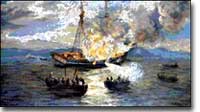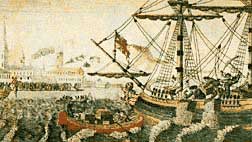
The Declaration of Independence
Lesson Plan
The Tea Act & Tea Parties
- Why was the East India Company allowed an exemption from tea taxes in the Tea Act of 1773?
- Why did the colonists react so violently to the resulting decrease in price from tea brought to the colonies by the East India Company?

The Gaspee was burned by colonists angry about taxes and British harassment of their ships.
The British were in a tough spot — and it was all because of tea.
After much conflict and the bloodshed at the Boston Massacre, the British repealed many of the Townshend Acts. But this partial repeal did not bring about a positive reaction in the colonies, as the repeal of the Stamp Act had. Too much had happened, now, regarding taxation. Not only had Parliament tried to tax the colonies on several occasions, but two taxes were still being collected — one on sugar, and one on tea.
The memories of the Boston Massacre and the strict laws forced on the colonists were still fresh in many people's minds. On one hand, after the tax repeals, importation of British goods started up again. But, problems with British customs officers continued. British ships patrolled the waters along the coastlines in order to monitor smuggling. One customs ship, the Gaspee, was burned to ashes by a group of angry merchants when it ran aground in Rhode Island. Clearly, it would take time for the colonists to heal from the betrayal they had experienced. But Parliament did not wait for that to happen.
Playing Monopoly

The British East India Company handled all trade with India and China. They were also responsible for bringing tea from those countries to England and the American colonies. In the years before the Revolution, the East India Company was almost bankrupt. To save it, Lord North, the British Prime Minister, gave the Company a trading monopoly with the American colonies. This meant that no other trading companies could import these goods, meaning all profits would go to them.
Parliament decided that the tax on tea would be maintained, but the Company would lower its prices. That way, colonists were still being taxed, but it wouldn't be as noticeable. Lord North hoped the colonists would be so happy to have cheaper tea that they would pay the tax without a fuss. It was a brilliant plan. However, it had one major flaw.

The British East India Company began with a royal charter from Queen Elizabeth in 1600 and developed into an economic powerhouse. When the company faced financial ruin during the 1770s, the British government stepped in with the Tea Act to help the struggling company.
The colonists were immediately suspicious. They could tell this was a plot to challenge their opposition to tax payments. Furthermore, they wondered how long the monopoly would keep prices low. Activist groups started up again, advocating for a boycott. Many went further and threatened violence to the customs ships in almost every port. In many cases, their threat was enough to convince the ships to turn around and leave the ports. But in some cases, violent actions occurred. In Annapolis, for example, citizens burned a ship and all of the tea on board.
You are Sam Adams. A reporter asks you, "Your tea is cheaper? What's your beef?" Give a short sound bite?
Boston, of course, reacted in a similarly extreme fashion.
The Boston Tea Party
Governor Thomas Hutchinson allowed three ships carrying tea to enter Boston Harbor. One cold, December night, before the tax on the tea could be collected, Bostonians took action. Radical townspeople stormed the ships and tossed 342 chests of tea into the water. The culprits were never identified because they were in costume, disguised as Native Americans.
The amount of damage in modern American dollars would be over $750,000. The effects in the colonies were great. None of the tea was saved. Not a single American colonist had a cup of that tea. Only the fish in Boston Harbor had that pleasure.
Find a link to the Boston Tea Party you think is trustworthy and write a brief review and rating of the website
- Why was the East India Company allowed an exemption from tea taxes in the Tea Act of 1773?
- Why did the colonists react so violently to the resulting decrease in price from tea brought to the colonies by the East India Company?
Start page | The Document | A Reading | Signers | Related Information | Jefferson's Account | Declaration House | Declaration Timeline | Rev. War Timeline | More Resources | Lesson Plan |




